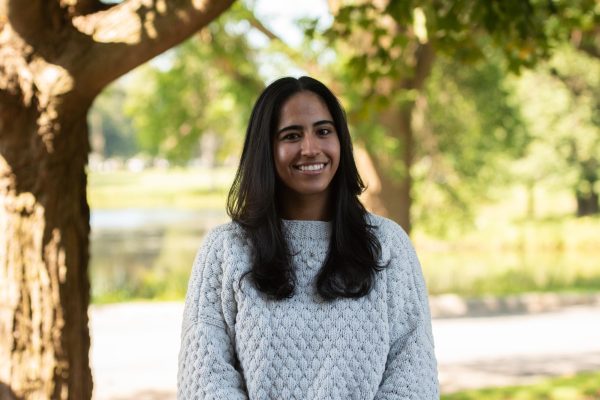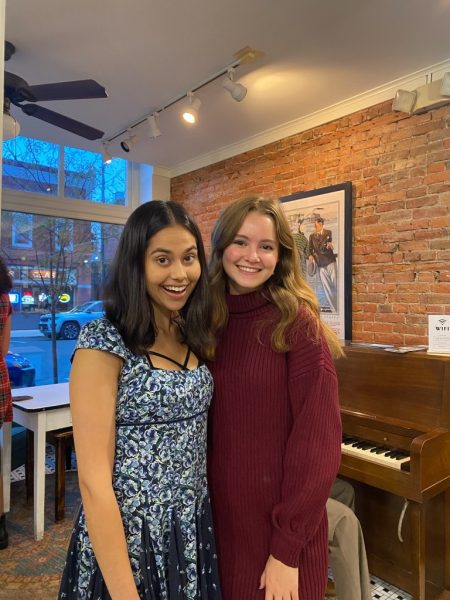Following Student Protest, Professor Bruce Rutherford Discusses Elliot Abrams’ Colgate Appearance
Bruce Rutherford — associate professor of political science and the organizer of Elliot Abrams’ March 28 speaking engagement on campus — hosted a follow-up conversation titled “Should Elliot Abrams Have Been Invited to Speak at Colgate” on Tuesday, April 18 in Persson Hall. The conversation followed the student protests and controversy surrounding the lecture Abrams’ gave last month about the Middle East.
Rutherford’s conversation with attendees covered Abrams’ academic and political qualifications, accusations of war crimes, performative activism and the lived experience of minorities on Colgate University’s campus. While the conversation was small — Rutherford was joined by about 10 students — several attendees shared ideas that led to discussions on broader issues like campus marginalization and the selection process of speakers.
During the conversation, Professor Rutherford explained that, when thinking about bringing a speaker, he looks for professional and academic qualifications. He noted Abrams’ extensive credentials and ability to take nuanced issues and express them in a concise way in which people can understand complicated policy problems.
“He made several insightful points that differed from my views with regard to the Palestinian-Israeli conflict, Iran’s nuclear program, water scarcity in the Middle East, the impact of the green revolution on the Middle East and the future of Egyptian politics,” Rutherford said.
Many students, after hearing of Abrams’ visit to campus, protested his lecture in person. They also spread their disapproval via social media. The protestors charged that Elliot Abrams is a war criminal and that he is guilty of committing genocide against the Mayan people. Rutherford responded to these claims in the conversation.
“International criminal law emphasizes the principle of personal culpability — in other words, a prosecutor must have clear evidence that an accused individual personally gave the order to commit a war crime or personally carried out a war crime,” Rutherford said. “In light of this principle of personal culpability, the charge that Mr. Abrams committed war crimes is baseless. So is the charge that he committed genocide.”
When asked about the accusations against Abrams, and whether there was information he had not considered that he later learned during the protest, Rutherford said that he was not expecting a protest.
“I was surprised that false accusations against a speaker were distributed so widely on campus. We have several faculty with expertise on international law who could have provided information about the definition of war crimes,” Rutherford said. “We need to create an atmosphere where students feel comfortable asking faculty about complicated topics such as international law, and encourage students to inform themselves with accurate information before adopting an opinion on a speaker.”
Senior Juny Ardon attended the conversation and was active in protesting the lecture. She shared her opinion on Abrams’ war crime accusations.
“[The accusations] are definitely real,” Ardon said. “I myself am the daughter of Guatemalan and Salvadoran immigrants and have heard personal anecdotes of experiences under General Efrain Rios Montt’s rule which included mass genocide of Mayan people. Elliot Abrams was involved in these murders and more through his foreign policies under Reagan’s Administration that caused genocide in Guatemala and other Latin American Countries such as Nicaragua, Panama and Uruguay. I encourage students to be aware, informed and even read personal stories of victims of this violence.”
Ardon said she did not think the lecture was beneficial for students. She believes that resources directed toward speakers such as Abrams should be used elsewhere.
“I believe that this lecture did more harm than good,” Ardon explained. “I understand the value of seeing both sides of a debate, but his views could’ve easily been watched on a free YouTube video. There are departments on campus that are heavily underfunded, such as the LGBTQ+ Studies Department, Women’s Studies Department and even [the] Middle Eastern and Islamic Studies Program, which pertains more closely to this talk.”
The Maroon-News could not independently confirm departmental funding levels.
The discussion soon shifted towards the idea of performative activism and how quickly campus movements lose traction. Ardon said that the protest was organized by Black female leaders on campus who spoke with President Brian W. Casey and the Political Science Department. While she stated their actions were not performative, she spoke generally about activism on campus.
“I think all activism on this campus is inherently performative. We stand on stolen Oneida land and occupy an institution that is white, elite and ableist. What is important is to stay active and keep the needle pushing,” she said. “What I say to privileged people on this campus is to be annoying. Speak anti-racism rhetoric in classes. Speak against ableist practices. Keep fighting. It’s important to rest but not for too long. Keep your friends engaged in these conversations. Don’t just stop them after class is over.”
Sophomore Reem Numan, who helped organize the original protest of Abrams’ March 28 lecture, was not able to attend the follow-up conversation. She shared her frustration with the advertisement of the discussion.
“A lot of the organizers were unable to attend the follow-up meeting because it was scheduled at 11:30 on a Tuesday, which is when almost all of us have class,” Numan said. “I am also unaware of who was emailed about the event and who wasn’t. I never got an email about the event and found out about it two days before from my friend who’s in [Political Science].”
Adding that she wished protest leaders were included in the planning of the follow-up conversation, Numan felt that the original organizers were not able to voice their concerns.
“I think the conversation could’ve been a lot more productive if everyone who wanted to be there could’ve been there in the first place,” Numan added. “It is my inference that a lot of assumptions were made on our behalf, and we weren’t able to speak up for ourselves.”
Junior Kata Mims also attended the follow-up conversation on Tuesday and spoke about the benefits of open discussion to address greater issues on campus.
“There is true potential for student-student and student-faculty dialogue on polarizing topics when an effort is made to reevaluate personal biases, to approach interaction with an open mind, and to listen without projecting negative emotions onto the conversation,” Mims said.
Other students spoke about the importance of having speakers with lived experience and having more representative speakers in the future. This idea also resonated with Professor Rutherford.
“Several of the students at the discussion spoke of the importance of bringing speakers to campus with a wider variety of lived experiences,” Rutherford said. “This is a wonderful suggestion. I plan to work with my colleagues in the Middle East and Islamic Studies program to bring speakers who can help us better understand the culture, history and experiences of people from the Middle East and from the broader Islamic world.”

Mehek Singh is a senior from Baltimore, MD concentrating in international relations and minoring in global public and environmental health. She has previously...






